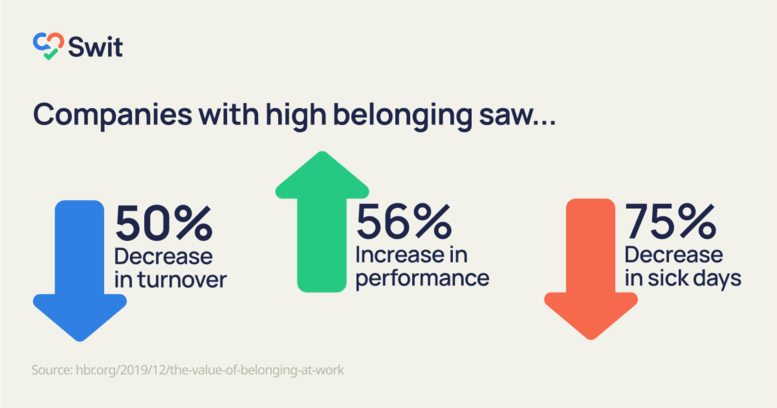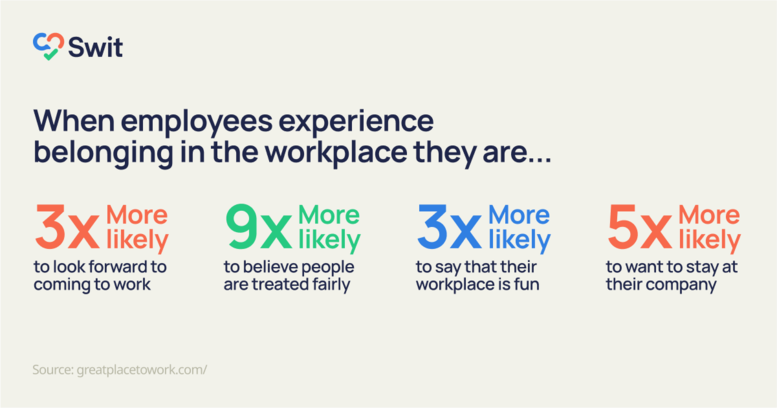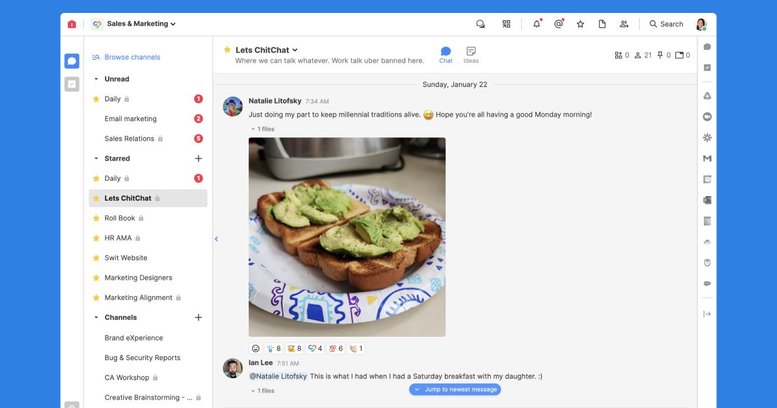
The Future of Work: Workplace Belonging for Distributed Teams
HR strategies for fostering a cohesive remote work culture
May 15, 2023
In today’s modern workplace, the concept of belonging has become increasingly important. Recent studies from Lattice show that employee engagement, as a whole, is a major focus this year. Over 40% of HR leaders say engagement is their top priority in their People strategy initiatives. Furthermore, the majority of HR teams say they’re putting more effort into improving employee engagement this year.
It’s not enough to simply hire employees and provide them with a job. Rather, companies must make a concerted effort to create a sense of belonging among their staff, which is essential to the success of any organization.
What is belonging?
Belonging is the sense of being accepted and included by those around you. In our digital society, people are looking to develop a deeper sense of connection in their personal and work lives. People want to work for a company that shares their values and beliefs. If a company’s values align with an individual’s personal values, they are more likely to feel a sense of belonging.
What does this mean for organizations?
Belonging is good for business — The simple act of recognizing employees can heighten productivity, lower employee turnover, and inspire loyalty. Harvard studies show that high belonging was linked to a whopping 56% increase in job performance, a 50% drop in turnover risk, and a 75% reduction in sick days. For a 10,000-person company, this would result in annual savings of more than $52 million.

Recent research from Great Place to Work shows when employees experience belonging in the workplace they are:
- 3 times more likely to look forward to coming to Work
- 3 times more likely to say their workplace is fun
- 9 times more likely to believe people are treated fairly regardless of their race
- 5 times more likely to want to stay at their company for a long time
Why is belonging important to employees?
Humans crave connection at their convenience. The same Harvard studies show social belonging is a fundamental human need — 40% of people say that they feel isolated at work, resulting in lower organizational commitment and engagement.
U.S. businesses spend nearly $8 billion each year in diversity and inclusion training programs that miss the mark because they neglect our need to feel included. In fact, 56% of workers ranked a strong workplace culture as more important than salary.
There are several factors that can contribute to fostering a sense of belonging within a company. Some of the key things that people look into when job searching are company values, career development opportunities, employee recognition, and inclusivity in their work culture.

How do you create a workplace of belonging?
Creating a workplace of belonging for a fully remote company requires additional effort and considerations compared to a traditional in-person workplace. These are a few strategies that can help create a workplace of belonging for a remote company.
Foster open communication
Encourage frequent and open communication among team members to create a sense of connection and collaboration. Be a humble listener and help employees feel safe at work. Regular virtual meetings, and offering various channels of communication can help team members to collaborate and bond with each other.

Emphasize inclusion and diversity
Prioritize and celebrate diversity and inclusivity, and create policies that support equity and opportunities for everyone. Foster an inclusive culture by encouraging individuals to share their unique experiences and perspectives. With our RAN work culture, our employees are able to visit family or travel to expand their horizons at any time and share their experiences with colleagues.
Build relationships
Create opportunities for team members to build relationships and bond with each other, such as virtual team-building activities or social events. Encourage informal communication among team members to create a sense of community.
Provide support and resources
Provide resources and support for employees to help them feel safe, supported, and empowered. This can include mental health support, employee resource groups, and diversity and inclusion training.

Establish clear expectations
Clearly define expectations for communication, collaboration, and productivity to create a sense of structure and purpose. Swit’s Goals plug-in helps team members create clear and concise goals that will help develop their careers.
Develop a strong culture
Develop a strong company culture that reflects the values and mission of the company and ensures that remote employees are included and engaged. Company outings or retreats can help develop a strong culture while making employees feel valued and included.
Invest in your employees
Investing in your employees' development reminds them that you value their experience and new perspectives. You want your employees to love growing within the organization, and have the necessary tools and funds to do so.
Embrace flexibility in work and life
Embracing flexibility in the workplace allows for more efficient and effective communication, increased creativity, and the ability to adapt to changing circumstances. This flexibility can not only increase productivity and job satisfaction, but also lead to a better work-life balance.

By implementing these strategies, remote companies can create a sense of belonging and connection among employees, which can lead to improved morale, increased productivity, and higher retention rates.
At Swit, our mission is to Re:Humanize the Workforce, which involves moving away from the traditional view of employees as mere resources or machines, and towards a more holistic view of the employees as people with feelings, aspirations, and personal needs. This can lead to a healthier and more fulfilling work environment for everyone.
A company that prioritizes inclusivity, employee well-being, and career development can help strengthen a sense of belonging among its employees. A healthy workplace is essential to the success of any company. It involves creating a culture of respect, shared purpose, and support, which helps employees feel valued, motivated, and engaged.
By fostering a sense of belonging in the workplace, companies can receive numerous benefits, including increased productivity, reduced turnover rates, and improved overall performance.
Kate Campos, People Manager